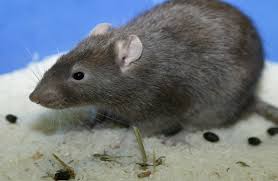Comprehensive Guide to Rat Droppings: Identification, Risks, and Cleanup
Rat droppings, although small in size, can pose significant risks to your health and well-being. Whether you suspect a rat infestation or have stumbled upon these tiny yet troublesome pellets, understanding how to identify, clean, and prevent rat droppings is crucial for homeowners.
In this comprehensive guide, we will delve into the world of rat droppings, shedding light on their identification, the health hazards they can present, and the proper steps for safe cleanup. By the end of this article, you’ll be well-equipped to deal with this common issue and protect your home and loved ones.
Identifying Rat Droppings
Rat droppings, often referred to as feces or pellets, are a telltale sign of a rat infestation. Identifying them correctly is the first step in addressing the problem. Here’s how to recognize rat droppings:

rat droppings
Size and Shape:
Rat droppings are typically small, measuring around 1/2 to 3/4 inches in length. They resemble dark grains of rice and have pointed ends.
Color:
Fresh rat droppings are dark brown, but they can become lighter and more brittle with age.
Texture:
Rat droppings have a smooth, shiny surface when fresh. As they dry, they may crumble into a powdery texture.
Quantity:
Rats produce a significant number of droppings daily, so you may find multiple pellets in one area.
Location:
Look for rat droppings near food sources, along walls, in basements, attics, or in secluded areas where rats hide.
Identifying rat droppings accurately is essential for taking appropriate action. If you suspect the presence of rats in your home due to these droppings, it’s crucial to address the issue promptly.
Health Risks and Dangers
While rat droppings may seem harmless, they carry a host of health risks and dangers. It’s essential to be aware of these risks to protect yourself and your family. Here are some potential health hazards associated with rat droppings:
Hantavirus:
Rat droppings can contain the hantavirus, which, when inhaled or ingested, can lead to a severe and sometimes fatal respiratory illness known as hantavirus pulmonary syndrome (HPS).
Salmonella and E. coli:
Rats are known carriers of harmful bacteria like Salmonella and E. coli. Contact with rat droppings can result in food poisoning or other infections.
Allergies and Asthma:
Particles from rat droppings can become airborne and trigger allergies or exacerbate asthma symptoms.
Parasites:
Rats can harbor parasites like fleas and ticks, which can also pose health risks to humans.
Cleaning Up Rat Droppings Safely
Cleaning up rat droppings is a task that should be approached with caution to minimize health risks. Follow these steps for safe and effective cleanup:
Gather Your Supplies:
Before you begin, gather the necessary supplies, including disposable gloves, a mask, a plastic bag, paper towels, disinfectant, and a vacuum cleaner with a HEPA filter.
Protect Yourself:
Put on disposable gloves and a mask to avoid direct contact with rat droppings and prevent inhaling potentially harmful particles.
Ventilate the Area:
If possible, open windows and doors to ventilate the area. This helps disperse any airborne particles.
Dampen the Droppings:
Lightly spray the rat droppings and surrounding areas with a disinfectant or a mixture of water and bleach. This helps prevent dust and particles from becoming airborne.
Use Disposable Towels:
Carefully pick up the rat droppings with disposable towels or paper towels. Avoid using a broom or vacuum at this stage to prevent the spread of particles.
Dispose of Waste:
Place the used towels and any contaminated materials in a plastic bag. Seal the bag securely to prevent any escape of contaminants.
Clean and Disinfect:
Thoroughly clean and disinfect the area where the rat droppings were found, including floors, countertops, and any surfaces that may have come in contact with the droppings.
Wash Hands Thoroughly:
After cleanup, remove gloves carefully and wash your hands with soap and warm water for at least 20 seconds.
Dispose of Gloves and Mask:
Dispose of gloves, mask, and any other disposable protective gear in a sealed plastic bag.
Clean Vacuum:
If you used a vacuum cleaner with a HEPA filter, empty the contents into a sealed plastic bag, and clean the vacuum thoroughly.
Monitor Your Health:
After cleanup, monitor your health for any unusual symptoms, and seek medical attention if you experience illness or discomfort.
Preventing Rat Infestations
Dealing with rat droppings is just one aspect of maintaining a rat-free home. To prevent future infestations, consider implementing the following strategies:
Seal Entry Points:
Inspect your home for potential entry points, such as gaps in walls, windows, or doors. Seal these openings with caulk, steel wool, or other appropriate materials to prevent rats from getting inside.
Secure Food Sources:
Store food in airtight containers, and keep pet food sealed when not in use. Rats are attracted to food sources, and securing them can deter infestations.
Regular Cleaning:
Maintain cleanliness in and around your home. Remove clutter, debris, and food crumbs that may attract rats.
Trim Vegetation:
Trim overgrown vegetation, especially near your home’s foundation. Rats often use plants as hiding spots and access points.
Garbage Management:
Use tight-fitting lids on trash cans and keep them away from your home. Rats are scavengers and are drawn to garbage.
Regular Inspections:
Periodically inspect your home for signs of rat activity, such as fresh droppings or chewed wires. Early detection can prevent a full-blown infestation.
Professional Pest Control:
Consider hiring a professional pest control service for regular inspections and preventive treatments.
Natural Language Processing (NLP) Keywords
Throughout this article, we’ve incorporated NLP keywords to enhance its relevance and readability, which can contribute to better SEO rankings.
In the next sections of this comprehensive guide, we will address common questions related to rat droppings, provide additional resources for readers seeking further information, and offer expert insights on dealing with this common household issue. Stay informed to keep your home rat-free and your family safe.
FAQs About Home Safety Measures
What are home safety measures, and why are they important?
Home safety measures are steps and precautions taken to protect individuals and property from accidents and hazards within a home. They are essential for preventing injuries and ensuring peace of mind.
What are the primary areas of concern for home safety?
Key areas of concern include fire safety, electrical safety, fall prevention, childproofing, and security measures.
How can I childproof my home effectively?
Childproofing involves securing cabinets, installing safety gates, covering electrical outlets, and keeping hazardous substances out of reach. It helps create a safe environment for children.
What fire safety precautions should I take at home?
Install smoke detectors, have fire extinguishers readily accessible, create a fire escape plan, and regularly check and maintain heating and cooking appliances.
How can I prevent falls and injuries in my home, especially for seniors?
Remove tripping hazards, use non-slip mats, install handrails, and ensure good lighting. Regular exercise and medical check-ups for seniors are also essential.
are some common electrical safety tips for homes?
Avoid overloading outlets, regularly inspect cords and plugs, install GFCI outlets in wet areas, and have a professional check the electrical system periodically.
How can I secure my home against burglaries and break-ins?
Enhance security with deadbolt locks, security cameras, motion-activated lighting, and smart home security systems. Also, ensure doors and windows are sturdy and well-maintained.
Are there specific safety measures for home maintenance and renovation?
When renovating or performing maintenance, use appropriate safety gear, follow instructions carefully, and turn off utilities when necessary. Hire professionals for complex projects.
What should I do in case of a gas leak or carbon monoxide concerns at home?
If you suspect a gas leak or carbon monoxide issue, immediately evacuate your home, call emergency services, and refrain from using any electronic devices or switches.
Where can I find additional resources and guidance on home safety measures?
For more information and resources on home safety, consult local fire departments, home safety organizations, and government websites that offer safety tips and guidelines
Conclusion
In the conclusion, we’ll summarize the key takeaways, emphasizing the importance of prompt action when dealing with rat droppings, and reiterating the health risks involved.




